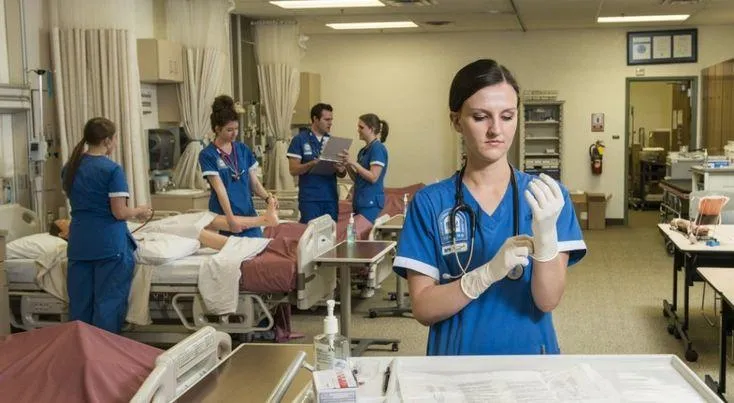OUR BLOG!

Uniting Teams Through Thoughtful Recruitment in American Critical Care Nursing
Recruitment efforts in American Critical Care Nursing hold the power to shape more than the immediate workforce; they can create strong and cohesive teams that significantly impact patient care and workplace satisfaction. Strengthening team cohesion through careful hiring practices ensures that partner hospitals build environments where collaboration thrives. By focusing on compatibility, shared goals, and teamwork, recruitment becomes a strategy that fortifies not only the nursing staff but the institution as a whole. When united teams approach challenges together, they are not just working—they are excelling.
Effective recruitment strategies that prioritize team cohesion create the environment necessary for collaboration to flourish. Hiring practices aimed at matching not only skills but interpersonal compatibility contribute to the development of harmonious work environments. Nurses who feel connected to their coworkers are more likely to engage in cooperative decision-making and support one another during demanding situations. This sense of unity promotes efficient workflows and strengthens morale, forming a foundation for sustainable success in patient care settings. Hospitals benefit in turn, as teams capable of seamless collaboration are better equipped to adapt to the complexities of modern healthcare.
The significance of well-functioning teams becomes even more evident in high-pressure scenarios. When nurses work as a cohesive unit, they are more equipped to handle the fast-paced and potentially overwhelming nature of critical care. Unified teams communicate more clearly under stress, reducing the risk of errors and ensuring smoother patient handoffs during emergencies. The shared trust and mutual support inherent in cohesive teams lead to quicker decision-making and coordinated efforts that directly enhance patient outcomes. A hospital’s capacity to deliver excellence, even in the face of adversity, relies heavily on the strength of its team dynamics.
At the heart of cohesive workplace culture is the reduction of miscommunication and the fostering of a shared purpose. Strategic hiring that prioritizes alignment between new recruits and existing teams minimizes friction, ensuring smoother integration into established workflows. Nurses who understand each other's working styles and motivations can focus more on their shared mission of delivering exceptional care rather than navigating interpersonal conflicts. A unified sense of purpose among team members elevates the overall atmosphere within care units, encouraging a collective commitment to quality and compassion. These environments are not only desirable places to work but also breeding grounds for excellence.
Clinical recruiters play an instrumental role in translating these aspirations into reality for partner hospitals. Their expertise allows them to identify candidates whose values and professional goals align with the team dynamics already present within a hospital. By considering both technical qualifications and cultural fit, clinical recruiters serve as a critical link in creating harmony within care units. They also emphasize the importance of transparent communication during the recruitment process, ensuring that candidates have a clear understanding of the hospital’s expectations, values, and opportunities for involvement in collaborative initiatives. This foundation of openness builds trust, laying the groundwork for lasting relationships and a healthy working culture.
Partner hospitals looking to strengthen team cohesion can adopt resolutions to maintain a focus on integrating teamwork into their recruitment practices. Developing mentorship systems that pair current staff with new hires ensures a smoother transition and fosters lasting professional connections within teams. Instituting cross-training programs between departments strengthens bonds among colleagues and enhances adaptability during periods of high workload. Hospitals may also consider hosting team-building workshops that promote collaboration skills and encourage open dialogue about shared goals and challenges.
Recommendations for supporting long-term team cohesion include implementing transparent performance review processes that acknowledge collaborative achievements, rather than focusing solely on individual outcomes. Recognizing teamwork reinforces its value and encourages ongoing collective effort. Hospitals can also benefit from offering incentives for team accomplishments, such as joint professional development opportunities or group wellness initiatives. These gestures amplify the message that unified effort is as vital to success as individual contributions. Integrating these principles into recruitment strategies attracts candidates who are drawn to environments that celebrate teamwork, ensuring a culture of cohesion perpetuates itself.
By focusing on meaningful hiring initiatives, partner hospitals can cultivate teams defined by unity, mutual respect, and shared ambition. These practices do more than fill vacancies—they create a workforce equipped to face challenges with confidence and grace. A cohesive team reduces stress, improves communication, and adds a layer of resilience to patient care protocols, enhancing outcomes for everyone involved. Recruitment becomes a stewardship of trust between hospitals and their staff, ensuring that those at the heart of care—nurses—are supported and empowered. Through strategic hiring grounded in team-building principles, hospitals can truly uphold their missions of excellence and compassion.



